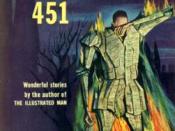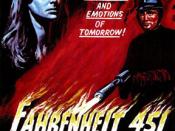Opinion,
Imagine a world where one wakes up to an unquestioning society, where books are burned and opinion suppressed. Such a society is described in Ray Bradbury's Fahrenheit 451. Ray Bradbury talks about a hypothetical society where freedom of speech is a myth and the minorities who disagree are killed. J.S. Mill however, disagrees with societies such as Ray Bradbury's in his book On Liberty, Of The Liberty Of Thought And Discussion. If J.S. Mill were to exist in a society such as Fahrenheit 451 he would probably not agree with it. In addition to J.S. Mill's book, Emily Dickinson and her poem Much Madness is Divinest Sense complement the same opposition to societies such as the one Ray Bradbury has depicted.
J.S. Mill believes that all opinions should be heard. (On Liberty, pg.76) "If all mankind minus one were of one opinion, mankind would be no more justified in silencing that one person than he, if he had the power, would be justified in silencing mankind."
J.S. Mill is expressing that neither of the two parties has the right to suppress the others opinion, not even the majority. The majority could be right, but then again so might the minority, which is why neither can be justified in silencing the other. Should one side be absolutely right then it could be justified in silencing the other.
The second argument made by J.S. Mill is why no one can be justified in silencing opinion. (On Liberty, pg.77) "Those who desire to suppress it (opinion), of course, deny its truth; but they are not infallible." Although someone might say another's opinion is wrong they are still capable of error and therefore the opinion may in fact be right. To deny the hearing of an opinion is to assume that...


